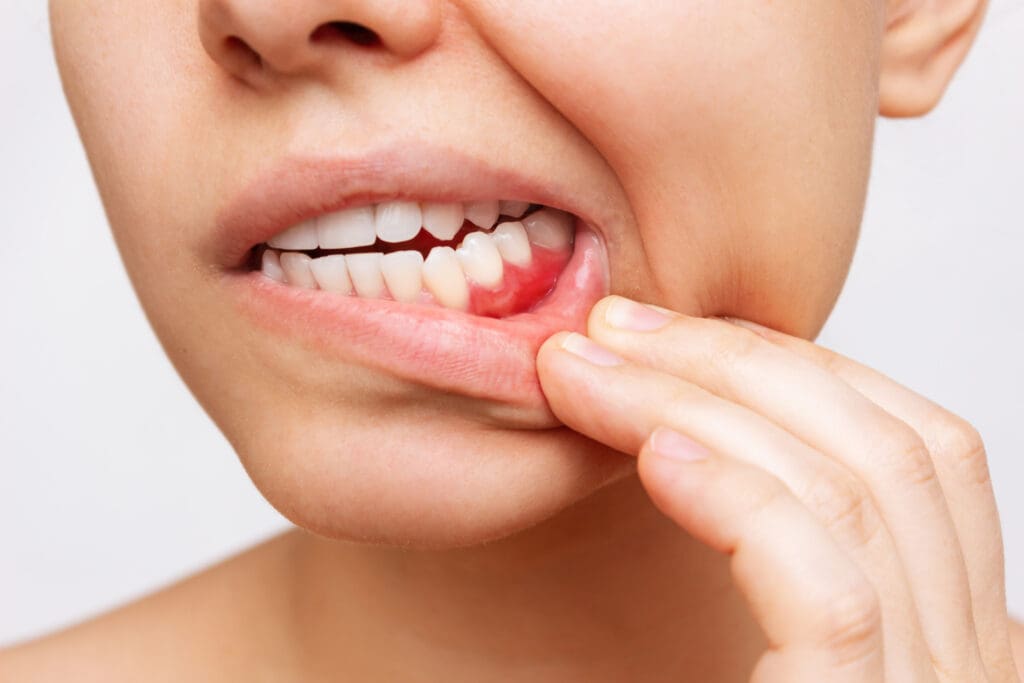Have you ever noticed a pink or red tinge in the sink after brushing or flossing? While it might seem like a small thing, bleeding gums are your mouth’s way of sending a signal. This common issue is often the first sign that your gums need attention.
At Hermitage Dental in Edmonton, AB, we provide caring and effective treatment for bleeding gums. Our goal is to help you understand what’s happening, improve your gum health, and protect your beautiful smile for the long term. Healthy gums are the foundation of a healthy mouth, and we are here to help you build that strong foundation.

Don’t Ignore Bleeding Gums: Your Guide to Healthier Smiles in Edmonton
Bleeding gums usually happen because the gum tissue has become irritated, inflamed, or infected. It’s not normal for healthy gums to bleed. Here are some of the most common reasons why it happens:
- Gingivitis (Early Gum Disease): This is the most common cause. It happens when a sticky film of bacteria called plaque builds up along your gumline. The bacteria irritate your gums, making them red, swollen, and likely to bleed.
- Inconsistent Oral Hygiene: Skipping brushing or flossing allows plaque to harden into tartar. This further irritates gums and only a dental professional can remove it.
- Brushing Too Hard: Using a hard-bristled toothbrush or scrubbing aggressively can actually damage delicate gum tissue and cause bleeding. A soft-bristled brush and gentle, circular motions are best.
- New or Inconsistent Flossing: If you haven’t flossed in a while or are just starting, your gums may bleed for a few days as they adjust to the cleaning. This should stop with gentle, regular flossing.
- Medications: Some medicines, especially blood thinners, can make gums more prone to bleeding. It’s very important to tell your dentist about all medications you take.
- Hormonal Changes: Fluctuations during pregnancy, menstruation, or menopause can make gums more sensitive and reactive to plaque.
- Other Health Factors: Conditions like diabetes or certain vitamin deficiencies can affect your body’s ability to fight infection, including in your gums.
Other Signs to Watch For:
Along with bleeding, you might notice:
- Red, swollen, or tender gums
- Persistent bad breath or a bad taste in your mouth
- Gums that are pulling away from your teeth (receding)
- Teeth that feel loose
- Discomfort when chewing
If you notice any of these signs, it’s time to visit us. Catching gum problems early is the key to simple, effective treatment.
How We Treat Bleeding Gums in Edmonton
At Hermitage Dental, we take a personalized approach to treating your gums in Edmonton. Your visit will start with a gentle but thorough exam. We’ll check the health of your gums, measure any pockets around your teeth, and assess your overall oral health. From there, we will create a clear periodontal disease treatment plan just for you. Here are the treatments we may recommend.
1. Professional Dental Cleaning & Improved Home Care
The first step is a professional cleaning to remove the plaque and tartar that brushing at home can’t reach. We will also review your daily routine with you. We can show you the most effective way to brush and floss to clean all surfaces without harming your gums. Sometimes, switching to a soft toothbrush, an antimicrobial toothpaste, or a therapeutic mouthwash is all you need to get things back on track.
2. Scaling and Root Planing (A Deep Cleaning)
If gum inflammation has progressed, you may need a deeper cleaning called scaling and root planing. This non-surgical treatment is very effective for gum disease.
- Scaling: We use specialized tools to carefully remove plaque and hardened tartar (calculus) from below your gumline. We go all the way down to the bottom of the pockets around your teeth.
- Root Planing: Next, we smooth the roots of your teeth. This process removes bacterial toxins and helps your gum tissue heal and reattach firmly to the clean, smooth root surfaces.
This deep cleaning might be done over one or two visits. Your gums may be a bit tender afterward, but this treatment is very important. It stops the progression of gum disease and gets your oral health back under control.
3. Ongoing Maintenance (Periodontal Maintenance)
After active treatment, healthy gums need consistent care. We often recommend more frequent cleanings for patients who have had gum disease, usually every three to four months. These maintenance visits allow us to monitor your gum health closely, remove any new buildup, and prevent problems from returning.
How to Prevent Bleeding Gums at Home
To help you keep your gums healthy and prevent bleeding in the future, we may suggest some simple changes you can make in your daily routine. The most important thing you can do is to brush and floss your teeth every day. Make it a habit to brush your teeth twice a day with a soft-bristled toothbrush and a fluoride toothpaste. Brush gently for at least two full minutes, and be sure to clean carefully along the gum line, where plaque likes to build up.
Brush and Floss Every Day
It’s just as important to floss once a day. Flossing removes food and plaque from between your teeth, where your toothbrush cannot reach. It’s normal for your gums to bleed a little when you first start flossing or if you have not done it in a while.
This bleeding should stop after a few days of regular, gentle flossing as your gums become healthier. Good daily brushing and flossing habits remove harmful bacteria and prevent the plaque buildup that causes bleeding gums.
Eat a Healthy and Balanced Diet
 What you eat plays a big role in your gum health. A balanced diet gives your body the nutrients it needs to keep your gums strong and to fight off infection. Try to eat foods rich in vitamin C, like oranges, strawberries, and bell peppers, because vitamin C helps your gums heal and reduces inflammation.
What you eat plays a big role in your gum health. A balanced diet gives your body the nutrients it needs to keep your gums strong and to fight off infection. Try to eat foods rich in vitamin C, like oranges, strawberries, and bell peppers, because vitamin C helps your gums heal and reduces inflammation.
You should also get enough vitamin D, which you can find in foods like eggs and fish, to support your bone and gum health. Calcium-rich foods like yogurt and leafy green vegetables help keep your teeth and jawbone strong. Crunchy fruits and vegetables, such as apples and carrots, can help clean your teeth as you chew.
Drink Plenty of Water
Make sure to drink plenty of water throughout the day. Staying hydrated is great for your whole body and your mouth. Water helps wash away leftover food particles and rinse out bacteria. It also keeps your mouth moist, which is important because a dry mouth can make it easier for bacteria to grow and irritate your gums. Try to drink water after meals and snacks.
Avoid Tobacco Products
If you use tobacco in any form, it’s one of the most harmful things for your gums. Smoking or chewing tobacco greatly increases your risk of gum disease, slows down healing in your mouth, and can cause your gums to pull away from your teeth.
It also causes bad breath and stains your teeth. Quitting tobacco can make a major difference in your oral health. If you need help quitting, please talk to your dentist or doctor. There are many resources available to support you.
Manage Your Stress
You may not realize it, but stress can affect your gum health too. When you are stressed, your body has a harder time fighting off infections, including infections in your gums. To help manage stress, you can try:
- Taking deep breaths
- Practicing relaxation exercises
- Getting regular physical activity
- Making time for hobbies you enjoy
- Talking with a friend or family member
Lowering your stress levels can keep your gums, including your whole body, healthier.
Visit Your Dentist Regularly
Finally, one of the best ways to prevent gum problems is to visit your dentist regularly. Seeing us at our Edmonton dental clinic every six months for a checkup and cleaning allows us to remove the plaque and tartar that brushing and flossing miss.
We can check for the early signs of gum disease and give you personalized tips on how to care for your teeth and gums at home.
These regular visits help us catch and treat small issues before they turn into big problems. If you are having ongoing gum problems, we may suggest coming in more often so we can monitor your progress and provide any extra care you might need.
Your Healthy Smile Starts with Healthy Gums
Bleeding gums are a common problem, but they’re also a solvable one. With the right care and professional guidance, you can have gums that are pink, firm, and free from bleeding.
Our Edmonton dental team at Hermitage Dental is dedicated to providing you with expert care in a comfortable environment. We believe in treating you as a whole person, not just a set of symptoms, and we’ll take the time to answer all your questions without judgement.
Don’t wait for a small sign to become a big problem. If your gums bleed when you brush or floss, it’s time to make an appointment. Contact our Edmonton dental clinic today at 587-806-4168 or request a visit online. Let’s get your gums back to perfect health!
